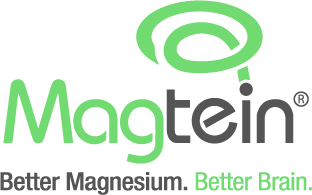Magnesium is an essential mineral that plays a critical role in over 300 biochemical reactions in the human body. Despite its importance, many adults do not achieve optimal magnesium intake. Low magnesium levels can subtly impact physical and mental health, often manifesting through a range of signs and symptoms. Understanding these signals and supporting magnesium intake through diet and supplementation can help maintain overall wellness.*

What Is Magnesium Deficiency?
Magnesium deficiency, also known as hypomagnesemia, occurs when the body’s magnesium levels fall below what’s needed to support cellular and biochemical processes.
Because magnesium is mostly stored inside cells and bones, blood levels can remain “normal” even when total body stores are low. As a result, mild magnesium deficiency often goes undetected – manifesting subtly through fatigue, mood changes, muscle tension, or restless sleep before it becomes clinically measurable.
Low magnesium status may result from inadequate dietary intake, excessive losses through sweat or urine, gastrointestinal issues that reduce absorption, or increased needs due to stress, aging, or certain medications. Research indicates that 50-70% of adults consume less magnesium than the recommended daily allowance, making it one of the most common micronutrient shortfalls worldwide.*
Common Signs and Symptoms of Magnesium Deficiency
Magnesium deficiency can present in both mild and more pronounced ways. While the severity and specific symptoms vary by individual, common indicators include:
- Muscle Cramps and Spasms: Magnesium regulates calcium and potassium in muscle cells. Low magnesium can increase excitability of muscles, leading to twitches, cramps, or spasms.
- Fatigue and Low Energy: Magnesium is vital for ATP production – the energy currency of cells. Insufficient magnesium may result in feelings of tiredness or decreased endurance.
- Sleep Disturbances: Magnesium modulates neurotransmitters involved in relaxation, such as GABA. Low levels can contribute to difficulty falling asleep, restless sleep, or reduced sleep quality.
- Mood Changes: Magnesium influences NMDA and GABA receptor activity, impacting emotional regulation. Deficiency may contribute to irritability, anxiety, or difficulty managing stress.
- Cardiovascular Irregularities: Magnesium supports heart rhythm and vascular tone. Inadequate magnesium intake can occasionally be linked to palpitations or increased blood pressure.
- Cognitive Impairments: Magnesium-dependent enzymes are crucial for synaptic plasticity and memory formation. Low magnesium may subtly affect focus, learning, and short-term memory.

Why Magnesium Matters
Magnesium is a fundamental mineral involved in more than 300 enzymatic reactions in the body, spanning critical functions such as ATP production, DNA and RNA synthesis, and protein formation. Magnesium acts as a cofactor in energy metabolism, stabilizes ATP molecules, and supports phosphate transfer – all essential for cellular energy and function.
Neurologically, magnesium regulates neurotransmitter release and maintains excitatory-inhibitory balance in the brain. It influences NMDA (N-methyl-D-aspartate) and GABA (gamma-aminobutyric acid) receptor activity, which are key for synaptic plasticity, learning, and emotional balance. Cardiovascularly, magnesium helps preserve normal myocardial electrical activity, vascular tone, and blood pressure regulation.
Muscle health also depends on magnesium’s role in calcium handling within cells. Adequate magnesium ensures proper contraction and relaxation cycles, reducing the likelihood of cramping, spasms, or fatigue. Collectively, these functions illustrate why even mild magnesium insufficiency can influence sleep quality, cognitive clarity, muscle performance, and cardiovascular health.*
Integrative Brain-Focused Magnesium: Magtein®
Not all forms of magnesium are the same. Many common forms – like magnesium oxide or citrate – primarily act in the digestive tract and muscles. Magtein (magnesium L-threonate), however, was developed to support brain magnesium levels more effectively.
Magtein combines magnesium with L-threonic acid, a metabolite of vitamin C, allowing it to cross the blood-brain barrier and increase magnesium concentrations within neurons. Research suggests this may support healthy synaptic density, learning ability, and overall cognitive performance.*
In human studies, daily supplementation with 1.5–2 grams of magnesium L-threonate (providing 108-144 mg elemental magnesium) has been associated with:
- Improved memory and executive function*
- Support for sleep quality and relaxation*
- Greater mental clarity during the day*
This makes Magtein a valuable addition for individuals seeking a more integrative approach – supporting both body-wide magnesium balance and brain-focused performance.*
Ensuring Adequate Magnesium Intake
Supporting healthy magnesium levels involves daily habits that combine nutrition, movement, rest, and thoughtful supplementation.
- Prioritize Dietary Sources: Choose magnesium-rich foods like spinach, Swiss chard, almonds, cashews, pumpkin seeds, black beans, lentils, quinoa, and brown rice. Including a mix of these foods daily helps meet magnesium needs naturally. They also provide nutrients such as vitamin B6 and antioxidants, which help the body use magnesium effectively.
- Support with Lifestyle Habits: Stay hydrated, move regularly, and maintain a consistent sleep schedule. Dehydration reduces magnesium transport, and intense exercise increases loss through sweat. Quality sleep helps magnesium support the nervous system’s repair and recovery processes.
- Address Low Magnesium Proactively: Some people – especially athletes, older adults, and those with digestive challenges – may need more than diet alone provides. Clinically studied supplements such as Magtein can support absorption and brain bioavailability. Consistent use with meals can help maintain magnesium-dependent processes tied to cognition, mood, and muscle function.*
- Monitor and Use Safely: Most people tolerate magnesium well, but higher doses can cause temporary digestive discomfort. Starting low and increasing slowly helps the body adjust. Those with kidney concerns or medications that affect magnesium should consult a healthcare professional before use.*
By combining magnesium-rich foods, lifestyle strategies, and evidence-based supplementation when appropriate, individuals can support magnesium status and overall wellness.*

Key Takeaways
Magnesium supports energy production, brain and muscle performance, heart rhythm, and mood balance. Low magnesium can show up as fatigue, cramping, restless sleep, or irritability. Focusing on nutrient-dense foods and, when appropriate, brain-targeted forms like Magtein helps maintain resilience, focus, and calm throughout the day.*
References
- Volpe SL. Magnesium in disease prevention and overall health. Adv Nutr. 2013;4(3):378S-383S.
- Rosanoff A, Weaver CM, Rude RK. Suboptimal magnesium status in the United States: Are the health consequences underestimated? Nutr Rev. 2012;70(3):153-164.
- Slutsky I, Abumaria N, Wu LJ, et al. Enhancement of learning and memory by elevating brain magnesium. Neuron. 2010;65(2):165–177.
- Liu G, Weinger JG, Lu ZL, et al. Chronic oral administration of magnesium-L-threonate improves learning and memory and upregulates synaptic plasticity-related proteins in aged rats. J Alzheimers Dis. 2016;49(4):953–966.
- Hausenblas HA, Lynch T, Hooper S, et al. Magnesium-L-threonate improves sleep quality and daytime functioning in adults with self-reported sleep problems: A randomized controlled trial. Sleep Med X. 2024;8:100121.
- National Institutes of Health (NIH). Magnesium – Fact Sheet for Health Professionals. https://ods.od.nih.gov/factsheets/Magnesium-HealthProfessional/. Accessed 2025.
These statements have not been evaluated by the Food and Drug Administration. This product is not intended to diagnose, treat, cure, or prevent any disease.



